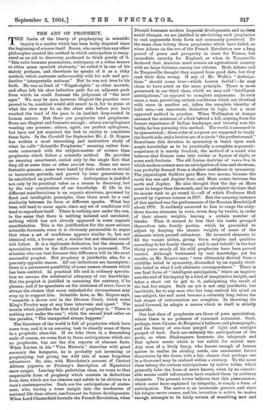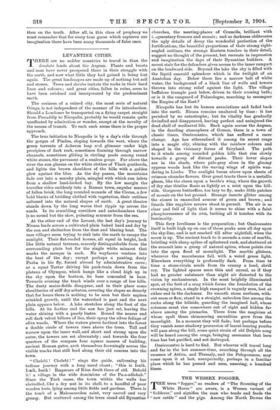THE ART OF PROPHECY.
THE limits of the liberty of prophesying in scientific inquiry is a matter which has been hotly disputed since the beginning of science itself. Bacon, who more than any other philosopher created the method in which anticipation is recog- nised as an aid to discovery, professed to think poorly of it. "Ista ratio humana praematura, a.nticipans, et a rebus temere et citius quam oportuit abstracta," he called it in one of his stately prefaces, and elsewhere he speaks of it as a risky method, which contrasts unfavourably with his safe and pro- ductive " interpretatio naturae." But he was not true to his faith. He was as fond of "Pisgah-sights" as other mortals, and often left his slow inductive path for an adjacent peak from which he could forecast the judgment of "the next ages." We may be sure, however illogical the practice were proved to be, mankind would still resort to it, for to guess at what the view may be on the other side before you have reached the head of the pass is an instinct deep-rooted in human nature. But there are prophecies and prophecies. Some are illogical and fantastic enough ; others are syllogisms wanting one premise ; others, again, are perfect syllogisms, but have not yet acquired the link to reality to constitute them facts. In the Cornhill for September Mr. J. D. Rogers has written a most interesting and instructive study of what be calls "Scientific Prophecies," meaning rather fore- casts concerned with the subject-matter of science than prophecies which follow a scientific method. He provides an amazing assortment, united only by the single fact that they all at some time or other proved true. Some are mere fantastic guesses ; some were based by their authors on trivial or inaccurate grounds, and proved by later generations to be established on profound verities. Anticipation is justified not only by its practical value as a means to discovery, but by the very constitution of our knowledge. If life in its different manifestations is an organic structure, governed by fixed and intelligible principles, then there must be a real similarity between its form at different epochs. What has been will tend to occur again, since any set of conditions will tend to reproduce itself. There is nothing new under the sun, in the sense that there is nothing isolated and unrelated, nothing which has not already appeared in some cognate manifestation. This is the justification for the more serious scientific forecasts, since it is obviously permissible to argue that when a set of conditions appears similar to, but not identical with, a former set, a similar but not identical result will follow. It is a legitimate deduction, but the element of speculation exists in the difference which is presumed. The scientist who can best forecast this difference will be the most successful prophet. But prophecy is justifiable, also, for a precisely opposite reason. All our inductions are incomplete; there is a permanent possibility of some unseen element which has been omitted. In practical life and in ordinary specula- tion we assume the substantial adequacy of our knowledge. But the prophet is justified in assuming the contrary, if he pleases; and if he speculates on the existence of error, there is always the chance that some unlooked-for circumstance may crop up to support him. Scientific laws, as Mr. Rogers says, "resemble a decree nisi in the Divorce Court, which some King's Proctor may at any time intervene and upset." The maxim which justifies the first kind of prophecy is, "There is nothing new under the sun "; while the second kind relies on the paradox, "The unexpected always happens."
The literature of the world is full of prophecies which have come true, and it is an amusing task to classify some of them in a prophetic class-list. If we take them in a descending scale of reason, we come first to those anticipations which are no prophecies, but are the dim reports of obscure facts. When Lucian in his "Vera Historia" describes with great accuracy the kangaroo, he is probably not inventing or prophesying, but giving the wild tale of some forgotten adventurer. So, also, with Herodotus's account of Central African pigmies, or Ptolemy's description of Equatorial snow ranges. Leaving this pedestrian class, we come to that respectable form of prophecy which consists in deductions from data which are too obscure and subtle to be obvious to a man's contemporaries. Such are the anticipations of states- men, who, having a truer insight into the tendencies of national life than others, can forecast its future developments. When Lord Chesterfield foretells the French Revolution, when
Disraeli forecasts modern Imperial developments and modern social changes, we are justified in attributing such prophecies to real arguments from facts not commonly perceived. To the same class belong those prophecies which have failed, as when Adams on the eve of the French Revolution saw a long period of peace and prosperity in store for France, but immediate anarchy for England, or when de Tocqueville declared that America must remain an agricultural country with no large fortunes among her citizens. Both Adams and de Tocqueville thought they argued from good data, but they read- their data wrong. If any of Mr. Wells's " Anticipa- tions " should come true—which heaven forbid !—he may claim to have acted on the same principle. There is more guesswork in our third class, which we may call "intelligent anticipations," as opposed to complete arguments. In such cases, a man, perceiving certain conditions which are identical with some in another set, infers the complete identity of both sets,—an inaccurate deduction in logic, but a most approved method in practice. When Wellington at Assaye assumed the existence of a ford behind a hill, arguing from his former experience of Indian landscape, and thereby won the battle, he was pursuing this method. The world is assumed to be symmetrical; three sides of a square are supposed to imply the fourth side, and a broken arc of a circle "the perfect round." Sometimes this devotion to symmetry is based upon such ample knowledge as to be practically a complete argument: sometimes it is merely freakish, the method of a crank who believes that Nature runs into circles or figures of eight, or some such fantasia. The old Ionian doctrine of .3-pLrs raoi, in which modern science sees an anticipation of ions and electrons, was probably framed from a shallow confidence in symmetry. The physiologist Gulliver gave Mars two moons, because the earth has one and Jupiter four, and Mars comes between the earth and Jupiter. He also thought that the day on Mars must be longer than the month, and he calculated the time that its moons took to go round it,—all of which Professor Hall proved by rigorous science in 1877. But the amazing instance of this method was the performance of the Russian Mendelejeff about 1870. It suddenly occurred to him to range the sixty- three known elements in rows, seven deep by twelve, in order of their atomic weights, leaving a certain number of blanks. Then it seemed to him that his ranks grouped. themselves into family parties, which he proceeded to adjust by denying the atomic weights of some of the elements which proved refractory. He invented elements to fill the vacant niches, giving them weights and qualities according to his family theory ; and lo and behold ! in the last thirty years nearly all his wild prophecies have been proved correct. Although buttressed by vast knowledge, yet his results, as Mr. Rogers says, "were ultimately derived from a childlike belief in symmetry, diversified by an equally child- like belief in what I call alternate correspondence." There is one final form of "intelligent anticipation," where an inquirer sees the end of his inquiry by a kind of imaginative insight, and takes a short cut to• get to it, anticipating the result of the last few stages. Such an act is not only justifiable, but inevitable, for to any man who has long centred his mind on one subject, the end must become a certainty long before the last stages of ratiocination are complete. In throwing his mind forward, he adopts a course which in itself is strictly scientific.
Our last class of prophecies are those of pure speculation, where there is no pretence of reasoned argument. Such, perhaps, were Cyrano de Bergerac's balloons and phonographs, and his theory of sun-heat purged of light and sunlight purged of heat. Such are certainly the anticipations of the poets, as when Shakespeare forecasts the telegraph and that sphere music which is too subtle for mortal ears. Any man of a lively fancy, who knows enough of human nature to realise its abiding needs, can enumerate future discoveries by the dozen with a fair chance that perhaps one in a thousand may be realised within a century. To the same class belong the curious anticipations by native tribes, which generally take the form of news known, when by no conceiv- able means could information have reached them by ordinary channels. The present writer believes that this phenomenon, which some have explained by telepathy, is simply a form of anticipation. The native is an inveterate guesser, and since his tongue never ceases, and his invention is active, he makes enough attempts to be fairly certain of stumbling now and







































 Previous page
Previous page